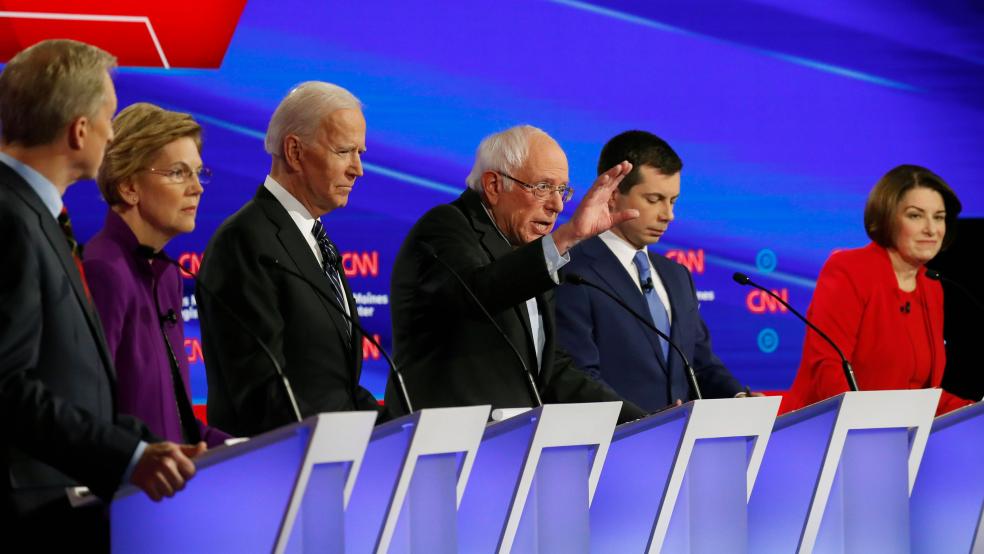The Iowa caucuses are less than three weeks away and the top four Democratic presidential contenders are tightly bunched in state polling, so the stakes were high at Tuesday night’s primary debate, the candidates’ last chance to make a major splash before Iowans gather on February 3.
Yet the debate turned out to be a listless affair, largely devoid of fireworks — and of answers or moments that might change the wide-open dynamics of the race. Still, there were some substantive differences highlighted in the exchanges as the candidates tackled issues ranging from foreign policy, especially regarding Iran and the Middle East, to climate change, trade and electability. (You can read the transcript at the Des Moines Register.)
Here are three fiscal takeaways:
They’re still fighting about health care. “Medicare-for-all has come up so much in these debates that bringing it up often elicits groans from people who cover these things. Little of it seems new anymore,” The Washington Post’s Aaron Blake writes. Sen. Bernie Sanders, asked about the price tag for his Medicare-for-All plan, argued that it would cost less than the status quo — though, as the Associated Press noted in a fact check, there’s no guarantee that’s true.
Moderates including former vice president Joe Biden pushed back, again insisting that their plans to build on Obamacare by adding a public option are a better way to expand health coverage and lower costs. And Sen. Amy Klobuchar again suggested that the debate over Medicare for All isn’t real given that the single-payer plan has no clear path to passing Congress. “Klobuchar then went a step further,” the Post’s Blake notes, “pointing to concrete things she’s done and would do, including on drug importation and a bipartisan bill on lowering drug prices. And she pointed to 137 things she’s said she can do in the first 100 days as president without Congress.”
Sen. Elizabeth Warren similarly emphasized that she would seek “to get as much as help to as many people as quickly as possible,” including by using executive power to lower prescription drug prices. She also talked up her plan to encourage competition in the pharmaceutical industry by letting the federal government make its own generic drugs. And she turned the health care issue against President Trump: “[W]e Democrats may argue among each other about the best way to do health care, but we're going to be up against a Republican incumbent who has cut health care for millions of people and is still trying to do that. I'll take our side of the argument any day.”
Democrats differ on government benefits for the rich. “A round of debate questions about free and lower-cost child care and schooling was actually about one of the bigger philosophical splits in the Democratic field: Is the social safety net only for poorer people, or is it for everyone?” Matt Pearce says at the Los Angeles Times.
Politico’s Ryan Lizza sums up the differences between the candidates when it comes to means-testing benefits (requiring those with higher incomes to pay more): “Sanders is the most consistent, arguing for the largest welfare state across all those categories with the least amount of means testing. His argument is that for government programs to enjoy wide popularity they need to be available to all Americans regardless of income. Buttigieg and Klobuchar, who, for instance, frequently attack free college plans as subsidizing tuition for millionaires, are on the other side of the spectrum.”
A few candidates talked about deficits and debt. “Color me flabbergasted that not one but two of the six candidates on stage tonight, Sen. Amy Klobuchar (D–Minn.) and South Bend Mayor Pete Buttigieg said—out loud, even—that they intend to reduce the deficit,” Reason Editor at Large Matt Welch writes.
The comments about deficits and debt came after CNN moderator Abby Phillip asked Sanders how he would keep his spending proposals “from bankrupting the country.” Sanders insisted that his plan would not bankrupt the country and would instead improve the lives of working-class families and the middle class.
Klobuchar responded by again calling for building on the Affordable Care Act. “If you want to be practical and progressive at the same time and have a plan and not a pipedream, you have to show how you're going to pay for it,” she said. She then brought up her plan to cut the deficit.
Buttigieg suggested that Democrats should own the issue of fiscal responsibility: “Look, our party should no longer hesitate to talk about the issue of the debt and the deficit. Now, we've got a dramatically better track record on it than Republicans do. In my lifetime, it's almost invariably Republican presidents who have added to the deficit, a trillion dollars under this president.”
Warren also mentioned the debt, though somewhat offhandedly, in making a case for her wealth tax: “We need to be willing to put a wealth tax in place, to ask those giant corporations that are not paying to pay, because that's how we build an economy and, for those who want to talk about it, bring down the national debt.”
That discussion, overall, didn’t go far enough for some budget hawks. “Several candidates did mention the debt and deficits and paying for policy proposals,” the Committee for a Responsible Federal Budget tweeted. “This is encouraging, but we need a detailed discussion about rising national debt in this campaign and how the candidates will budget.”





